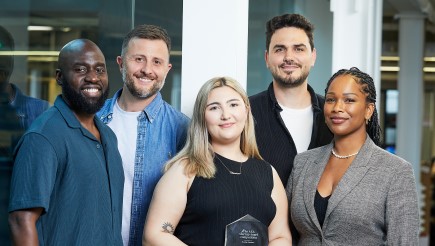After 10 years of working in different agencies Ryan Tym decided to go it alone and start his own branding agency, Lantern, in 2014.
From starting up out of a spare room, to achieving an award-winning team and an office in East London, we spoke to the entrepreneur about what’s kept him driven throughout his startup journey, and what advice he’d give to other early-stage entrepreneurs like himself.
First port of call? A point of difference
“When I created my first business plan I knew the kind of companies I wanted to be like. I used them as benchmarks to pitch myself against, and then improve on.”
“It’s a real challenge to stand out from the rest of the competition,” Ryan says. When starting Lantern he saw few agencies focusing on brand attitude and values. “I felt like that was missing a little bit in the way that UK agencies work, so that was really the driving force for how I wanted to do something a bit different.”
“It’s really important to understand what your point of difference is and what you stand for.” No point of difference? No point starting up.
Building from the basics up
A clear, goal-oriented plan was key for Ryan’s vision. “I created a plan for the business that within 5 years I wanted to have a certain number of employees and would be turning over a certain amount of money.”
“For me it was about finding a way to get that financial support initially, and luckily I managed to raise investment through the Seed Enterprise Investment Scheme, which is a government scheme set up to help fund small businesses.”
“Planning makes it easier to scale and grow your business because you’ve got the basics in place to begin with.”
Embracing independence
“Being your own boss is a really liberating experience. There’s a sense of freedom that’s quite hard to explain, even though you have more to do, you’re not accountable to anyone else. It’s quite a refreshing way of doing things after leaving a full time job.”
But be ready to embrace all that going it alone entails, warns Ryan. “The biggest challenge is having to make pretty much every decision that goes through the business on a daily basis. You need to find the time to make even tiny decisions, like ordering new paper. And other times it’s working out contracts for somebody joining, or deciding new business strategy. Ultimately the responsibility ends with you, and that can be quite relentless.”
So be ready to embrace the independence, and expect an initial ‘finding your feet’ period. “Once you learn to deal with that and the next really exciting thing happens, say you win your first client, you have your first great meeting– all of that rapidly outweighs it.”
Growing a network
A supportive personal network was crucial for Ryan, especially during the stresses of those first few weeks when it was particularly “important to have people around you that are willing you to do it.”
But make sure to build your professional network too, he advises. “I started off like a lot of businesses: out of a spare bedroom, but I quickly realised that was an isolating experience. In terms of trying to get new clients, network and things like that it seemed like a sensible move to join a co-working space.”
“We now get about 20% of new business through the co-working space that we’re in. It’s been really valuable in terms of effectively paying for the rent that we have on the business, which creates the sense of community we’re trying to achieve in the co-working space.”
Don’t forget about the network of other SME’s out there either. “There’s a lot more smaller businesses nowadays out there that work together, there’s a real community behind it.”
Creating something with lasting impact
When first starting-up, Ryan explains, “people fall into the trap of [building] a brand or a business around themselves.” But this can undermine the company’s credibility.
“You need to think about it on a bigger level… separately from you as a person, to what this is as a business and what you want it to stand for. I think it’s quite easy when you’re starting up to miss that step.”
It’s about, as Ryan says, creating a legacy that you can build and evolve alongside others. “I’ve always wanted to create something that was a business entity in its own right, so that one day maybe I might not be a part of it and it can live and exist on its own.”






